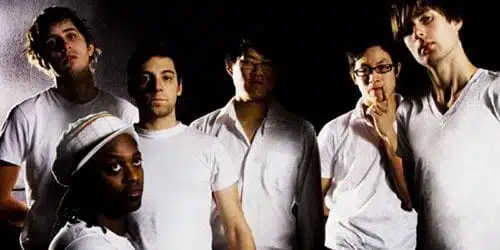
Two days after their sophomore LP Arm’s Way hit the racks and some weeks after it hit download queues, Islands revved up a national tour at Washington, DC’s Black Cat. Former Unicorn and Islands bandleader Nick “Diamonds” Thorburn has unearthed a Byzantine treasure chest from a subterranean pop goldmine, full of weird death-dreams and bloody sagas, but few people I know are as giddy about the album as I am. It’s too long, they say; it’s got too many time-signature switches without enough genre switches; it languishes in riff-intricate movements that never seem to go anywhere. And all the songs sound the same. True, true, and true, I reply. But as someone who has closely followed Thorburn’s evolution from the bratty wunderkind work of The Unicorns to the frenetic stops and starts of Islands 2006 debut Return to the Sea to the eloquent perambulations on Arm’s Way, each stage brings a further stock of beautiful revelations. Keep digging, I would tell Thorburn, and please don’t worry about us in the real world, for we’ll come around eventually. The disparate critical reaction could be proof that Arm’s Way is, to use the current parlance, a “grower”: as an example, see the early arguments over The National’s Alligator, the greatness of which few would now dispute. To make certain that my observation of Islands’ live show was tempered with skepticism and not overly dripping with fanboy-drool, I brought along a friend whose musical taste I admire but who had never really listened to Islands’ sure-footed jangle. We missed the openers but had no trouble finding floor-space close to the stage; Islands’ reputation for difficulty prevented a sellout. Opening with “Vertigo (If It’s a Crime)”, the eleven-minute finale to Arm’s Way that wallows in a tuneful exposition of crime and punishment for seven minutes before exploring a wavy, explosive coda, certainly sent the message that Islands would hardly turn away from the “difficult” tag. My companion patiently sipped PBR during the song’s opening passages and seemed to dig the second-half histrionics, if mildly. No one had the gall to actually leave during the meandering “Vertigo”, but likely the thought “much more of this and I’m out of here” crossed the minds of many in the room. “Vertigo” is the only song on Arm’s Way that actually sacrifices charm for pretension. Islands would not come that close to losing the audience’s attention again. “The Arm” followed with a festival ride of synthesizer and violin streaks (supplied by Sebastian Chow and Alex Chow, no relation). My objective sidekick was at this point nodding his head with his pleasure. “I’m on board,” he told me. The disco-kissing “Creeper” seemed to be a big favorite of fans in attendance, considering the uproarious reception they gave its Bee-Gees-by-way-of-the-Cars vision. The rollicking, vaguely hip-hop dish of Return to the Sea’s “Where There’s a Will There’s a Whalebone” was even more loudly applauded. And though the rap section was substituted by violin solo, the song still pranced with the subtle wildness of a Lil Weezy slow jam. Given that Arm’s Way had only dropped days previously, Islands’ rundown of what could be the album’s best three songs — “Pieces of You”, “I Feel Evil Creeping In”, and “Kids Don’t Know Shit” — was not as thrillingly received as it might be six months down the line. “Don’t Call Me Whitney, Bobby”, the calypso-thumper that is probably the group’s most popular song, encouraged a room-wide chorus of back-up singers. Closing the set was “Abominable Snow”, a song that’s been around since the days of The Unicorns, and which Thorburn and company burnished with energetic ease. After a singular encore of “Swans (Life After Death)”, the epic opener to Return to the Sea, Islands cut out for the night after what felt like an all too-brief appearance. The newbie I brought was certainly sold on the seriousness of Islands’ onslaught, but it remains to be seen whether Arm’s Way can be lifted from critical indifference to popular devotion on the strength of repeated listens and manic touring in the manner of Alligator circa 2005. In any case, those of us already sold on Thorburn’s magic hope he cares not a bean for critical consensus, and that he continues to churn out the perplexing pop that has become his calling card.
